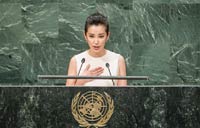|
 |
| UN Climate Summit opens with call for action? |
|
 |
| Climate protesters arrested in march on Wall Street? |
More than 120 heads of state or government and business leaders attended the one-day event in a bid to raise ambition, mobilize resources, and generate actions towards a universal climate deal next year in Paris.
"The purpose of the 2014 Climate Summit was to raise political momentum for a meaningful universal climate agreement in Paris in 2015 and to galvanize transformative action in all countries to reduce emissions and build resilience to the adverse impacts of climate change," said the Chair's Summary and Outcome Document issued at the end of the UN summit.
"I asked leaders from government, business, finance and civil society to crystallize a global vision for low-carbon economic growth and to advance climate action on five fronts: cutting emissions, mobilizing money and markets, pricing carbon, strengthening resilience, and mobilizing new coalitions," the chair said in the paper.
"We heard strong commitment for a meaningful, universal climate agreement in Paris next year, with a first draft to be presented in Lima in December," UN Secretary-General Ban Ki-moon said as he was closing the summit.
"Leaders reaffirmed their determination to limit global temperature rise to less than two degrees Celsius by cutting emissions," Ban said.
Many leaders, from all regions and all levels of economic development, advocated a peak in greenhouse gas emissions before 2020, decisively reduced emissions thereafter, and climate neutrality in the second half of this century, he said.
Ban also announced that many countries have made commitments to cutting emissions and new coalitions formed in areas of forestry, energy efficiency and transportation.
Also present at the summit were 800 leaders from business, finance and civil society.
Joining the chorus of the summit, UN agencies pledged actions on curbing the effects of climate change and transition towards a sustainable world economy.
Earlier on Tuesday, the UN Environment Programme (UNEP) announced a new initiative to accelerate the transition to more efficient appliances and equipment to reduce global energy demand, mitigate climate change and improve access to energy.
The plan aims to bring together inter-governmental and non-governmental organizations, appliance and equipment manufacturers, utilities, international development banks and financial institutions, to provide tailored assistance to governments on how to facilitate the permanent transition to energy-efficient products.
